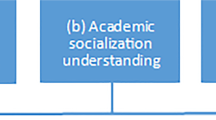Abstract
The ability to comprehend, discuss, and use disciplinary texts is central to graduate education. Although techniques for teaching writing have been well-discussed, and even incorporated into graduate curricula, the same is not true for techniques of scholarly reading, a crucial skill that is largely untaught and which students must learn independently or through shared culture. We argue that more explicit training in reading has potential benefits for graduate student education. Drawing on thirty-six in-depth interviews with students in the social sciences, we focus on the routines of managing academic reading, necessary for accessing information for research. Graduate students develop techniques and schedules that permit them to read rapidly or carefully, to read for different academic purposes, and to make information retrievable through notating. We suggest how graduate programs might incorporate reading education into the curriculum.
Similar content being viewed by others
Notes
Reports of how leading scholars read are sometimes spread informally. Pitirim Sorokin was known as a scholar who read widely, if superficially. In contrast, his colleague Talcott Parsons had the reputation as a selective, but deep, reader. How scholars move from reading to notating is less known, but Robert Merton, for instance, had an elaborate system of note-taking and indexing (Hunt 1961: 61; Lawrence Nichols, 2016, personal communication).
References
Abbott, A. (2014). Digital Paper: A Manual for Research and Writing with Internet and Library Materials. Chicago: University of Chicago Press.
Adler, P., & Adler, P. (2005). The identity career of the graduate student: professional socialization to academic sociology. The American Sociologist, 36(2), 11–27.
Adler, M., & Van Doren, C. (1972). How to Read a Book: The Classic Guide to Intelligent Reading. New York: Simon and Schuster.
Becker, H. (1986). Writing for Social Scientists: How to Start and Finish Your Thesis, Book, or Article. Chicago: University of Chicago Press.
Becker, H., Geer, B., Hughes, E., & Strauss, A. (1961). Boys in White: Student Culture in Medical School. Chicago: University of Chicago Press.
Bernstein, S. (1972). Getting it done: notes on student fritters. Urban Life and Culture, 1, 275–292.
Billig, M. (2013). Learn to Write Badly: How to Succeed in the Social Sciences. Cambridge, UK: Cambridge University Press.
Bowman, L. L., Levine, L. E., Waite, B. M., & Gendron, M. (2010). Can students really multitask? An experimental study of instant messaging while reading. Computers and Education, 54(4), 927–931.
Caverly, D., & Orlando, V. (1991). Textbook Study Strategies. In R. Flippo & D. Caverly (Eds.), Teaching Reading and Study Strategies at the College Level (pp. 88–165). Newark: International Reading Associates.
Dillon, A. (1992). Reading from paper versus screens: a critical review of the empirical literature. Ergonomics, 35(10), 1297–1326.
Douglas, J. Y. (2015). The reader’s brain: How neuroscience can make you smarter. Cambridge, UK: Cambridge University Press.
Ferrales G., & Fine G. (2005). Sociology as a vocation: Reputations and group cultures in graduate school. The American Sociologist, 32(2), 57–75.
Fox, A. B., Rosen, J., & Crawford, M. (2009). Distractions, distractions: does instant messaging affect college students’ performance on a concurrent reading comprehension task? Cyber Psychology & Behavior, 12(1), 51–53.
Grady, R. K., La Touche, R., Oslawski-Lopez, J., Powers, A., & Simacek, K. (2014). Betwixt and between: the social position and stress experiences of graduate students. Teaching Sociology, 42(1), 5–16.
Hunt, Morton M. 1961. How Does It Come to Be? New Yorker (January 28):39–63.
Hunt, A., Mair, C., & Atkinson, M. (2012). Teaching community networks: a case study of informal social support and information sharing among sociology graduate students. Teaching Sociology, 40(3), 198–214.
Johansson, R., Holmqvist, K., Mossberg, F., & Lindgren, M. (2012). Eye movements and reading comprehension while listening to preferred and non-preferred study music. Psychology of Music, 40(3), 339–356.
Kohl, H. (1998). Reading, How To. Portsmouth, NH: Heinemann.
Littau, K. (2006). Theories of Reading: Books, Bodies, and Bibliomania. Cambridge: Polity.
Malone, S. A. (1997). Mind skills for managers. Brookfield, VT: Gower Publishing.
Mangen, A., Walgermo, B. R., & Brønnick, K. (2013). Reading linear texts on paper versus computer screen: effects on reading comprehension. International Journal of Educational Research, 58, 61–68.
Mills, C. W. (1959). The sociological imagination. New York: Oxford University Press.
Mueller, P., & Oppenheimer, D. (2014). The pen is mightier than the keyboard: advantages of longhand over laptop note taking. Psychological Science, 25(6), 1159–1168.
Olivers, C. N. L., & Nieuwenhuis, S. (2005). The beneficial effect of concurrent task-irrelevant mental activity on temporal attention. Psychological Science, 16(4), 265–269.
Prose, F. (2006). Reading Like a Writer: A Guide for People Who Love Books and for Those Who Want to Write Them. New York: Harper.
Richlin-Klonsky, J., Strenski, E., & Giarrusso, R. (Eds.) (2001). A guide to writing sociology papers (5th ed.). New York: Worth Publishers.
Roberts, J. C., & Roberts, K. A. (2008). Deep reading, cost/benefit, and the construction of meaning: enhancing reading comprehension and deep learning in sociology courses. Teaching Sociology, 36(2), 125–140.
Wolf, M. (2007). Proust and the Squid: The Story and Science of the Reading Brain. New York: Harper.
Zerubavel, E. (1997). Social Mindscapes: An Invitation to Cognitive Sociology. Cambridge, MA: Harvard University Press.
Zerubavel, E. (1999). The Clockwork Muse: A Practical Guide to Writing Theses, Dissertations and Books. Cambridge, MA: Harvard University Press.
Acknowledgments
The authors thank Howard Becker, Joel Best, Charles Camic, Shannon Fitzsimons, Gianna Mosser, and Christopher Wellin for their insightful feedback and suggestions, as well as Kemi Adeyemi, Amanda Allan, and Gemma Brennan for help in transcribing interviews. This project was supported by the Alumnae of Northwestern University Grants Program and the Searle Center for Teaching Excellence Innovation in Teaching Grant.
Author information
Authors and Affiliations
Corresponding authors
Rights and permissions
About this article
Cite this article
Wohl, H., Fine, G.A. Reading Rites: Teaching Textwork in Graduate Education. Am Soc 48, 215–232 (2017). https://doi.org/10.1007/s12108-016-9322-0
Published:
Issue Date:
DOI: https://doi.org/10.1007/s12108-016-9322-0




